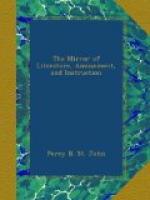FIRST LITERARY ATTEMPTS.
About this time Sir Walter employed his leisure in collecting the ballad poetry of the Scottish Border. His inducement to this task was subsequently described by him as follows:—
“A period,” says Sir Walter, “when this particular taste for the popular ballad was in the most extravagant degree of fashion, became the occasion, unexpectedly indeed, of my deserting the profession to which I was educated, and in which I had sufficiently advantageous prospects for a person of limited ambition. * * I may remark that, although the assertion has been made, it is a mistake to suppose that my situation in life or place in society were materially altered by such success as I attained in literary attempts. My birth, without giving the least pretension to distinction, was that of a gentleman, and connected me with several respectable families and accomplished persons. My education had been a good one, although I was deprived of its full benefit by indifferent health, just at the period when I ought to have been most sedulous in improving it.” He then describes his circumstances as easy, with a moderate degree of business for his standing, and “the friendship of more than one person of consideration, efficiently disposed to aid his views in life.” In short, he describes himself as “beyond all apprehension of want.” He then notices the low ebb of poetry in Britain for the previous ten years; the fashionable but slender poetical reputation of Hayley, then in the wane; “the Bard of Memory slumbered on his laurels, and he of Hope had scarce begun to attract his share of public attention;” Cowper was dead, and had not left an extensive popularity; “Burns, whose genius our southern neighbours could hardly yet comprehend, had long confined himself to song-writing; and the realms of Parnassus seemed to lie open to the first bold invader.” The gradual introduction of German literature into this country during such a dearth of native talent, now led Sir Walter to the study of the German language. He also became acquainted with Mr. G. Lewis, author of The Monk, who had already published some successful imitations of the German ballad school. “Out of this acquaintance,” says Sir Walter, “consequences arose, which altered almost all the Scottish ballad-maker’s future prospects of life. In early youth I had been an eager student of ballad poetry, and the tree is still in my recollection, beneath which I lay and first entered upon the enchanting perusal of Percy’s Reliques of Ancient Poetry. The taste of another person had strongly encouraged my own researches into this species of legendary lore; but I had never dreamed of an attempt to imitate what gave me so much pleasure.” He then speaks of some successful metrical translations which he made at the High School; but in original rhyme he was less fortunate. “In short,” says Sir Walter, “except the usual tribute to a mistress’




